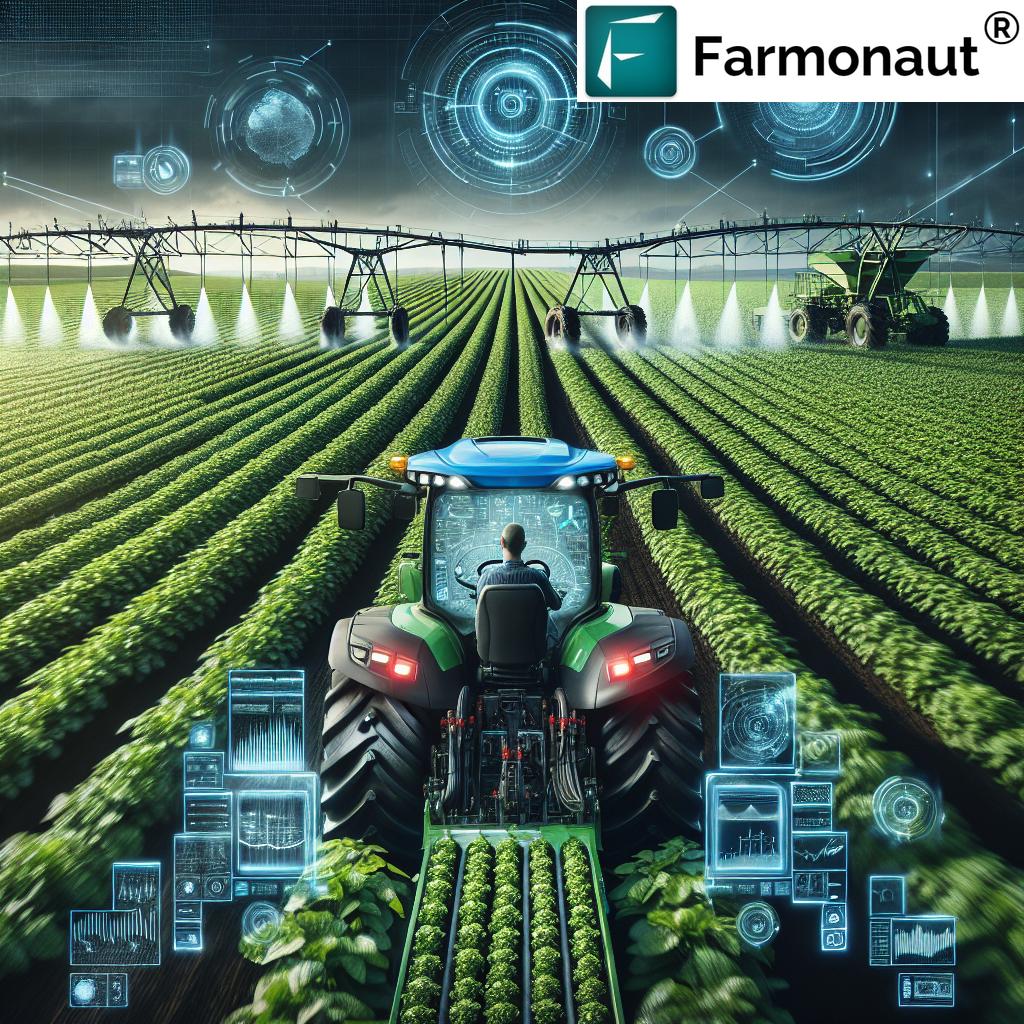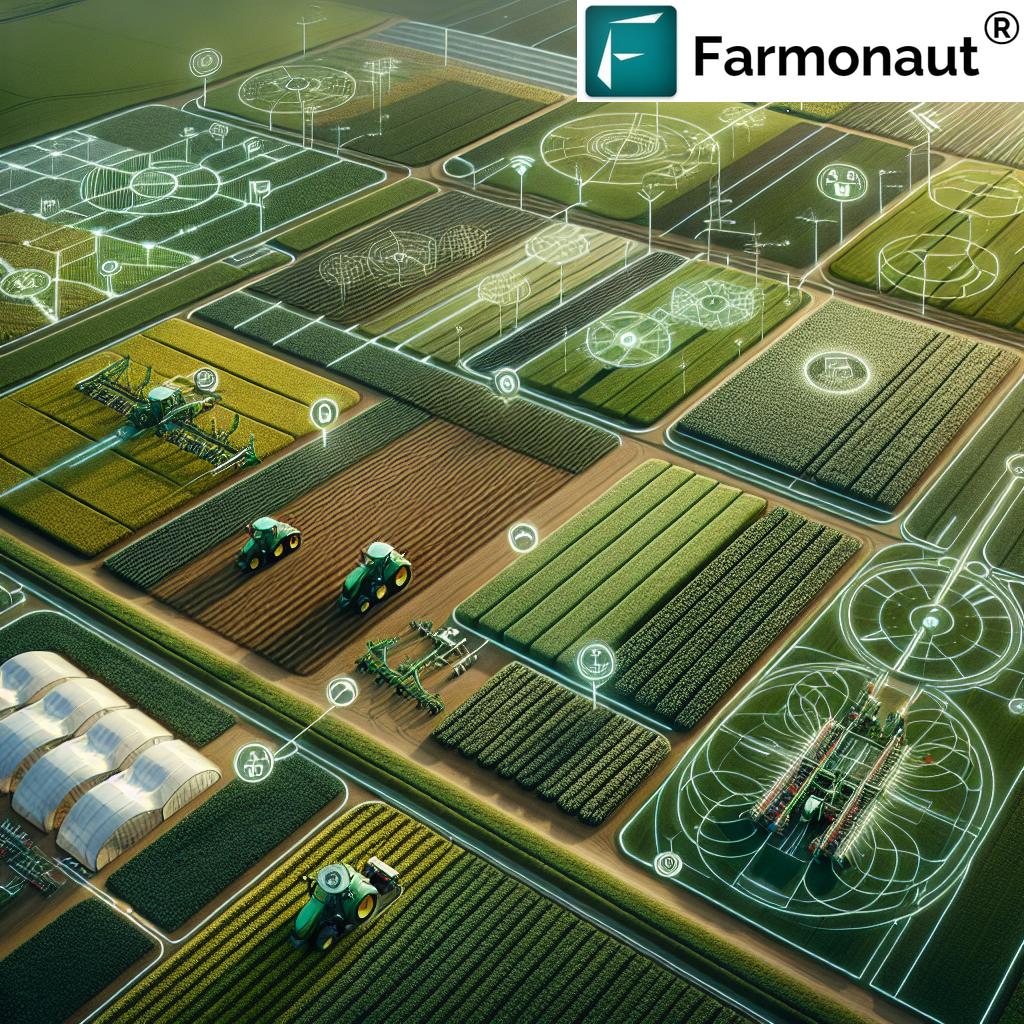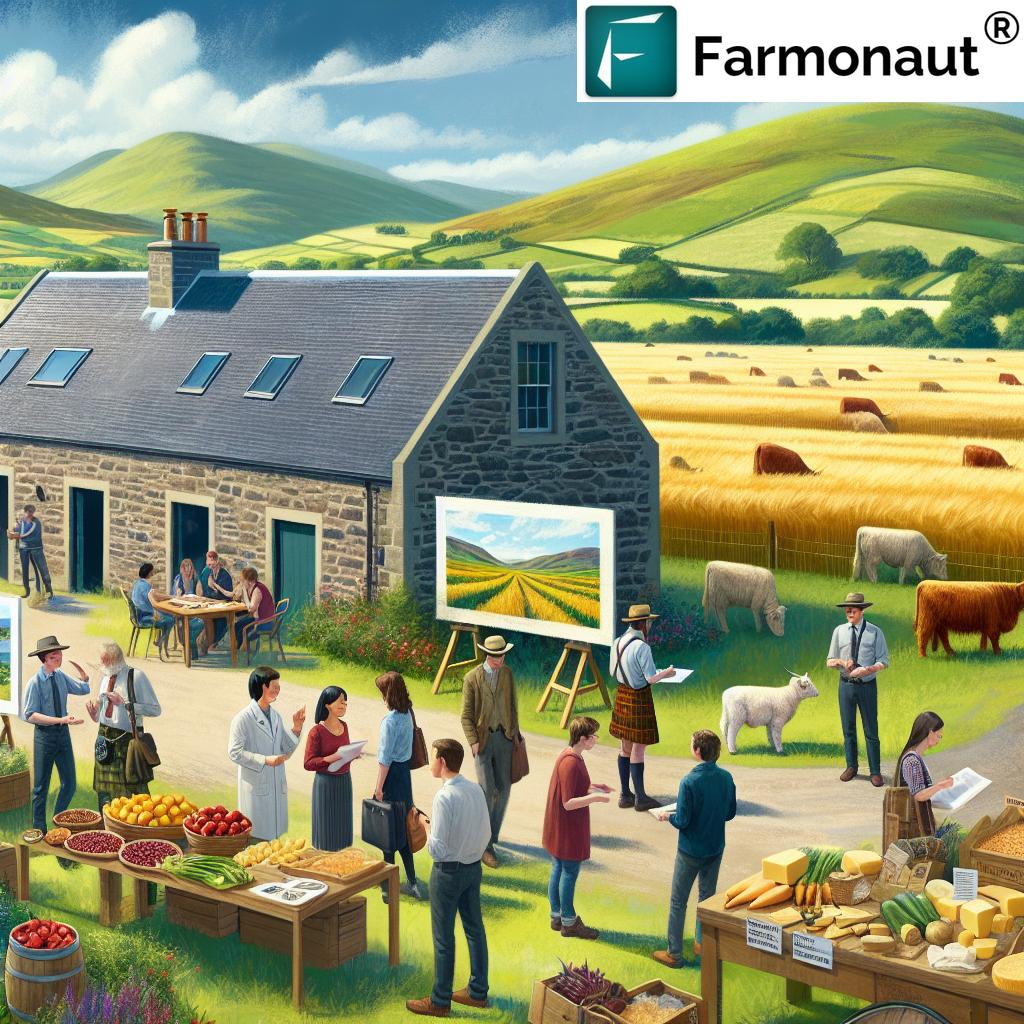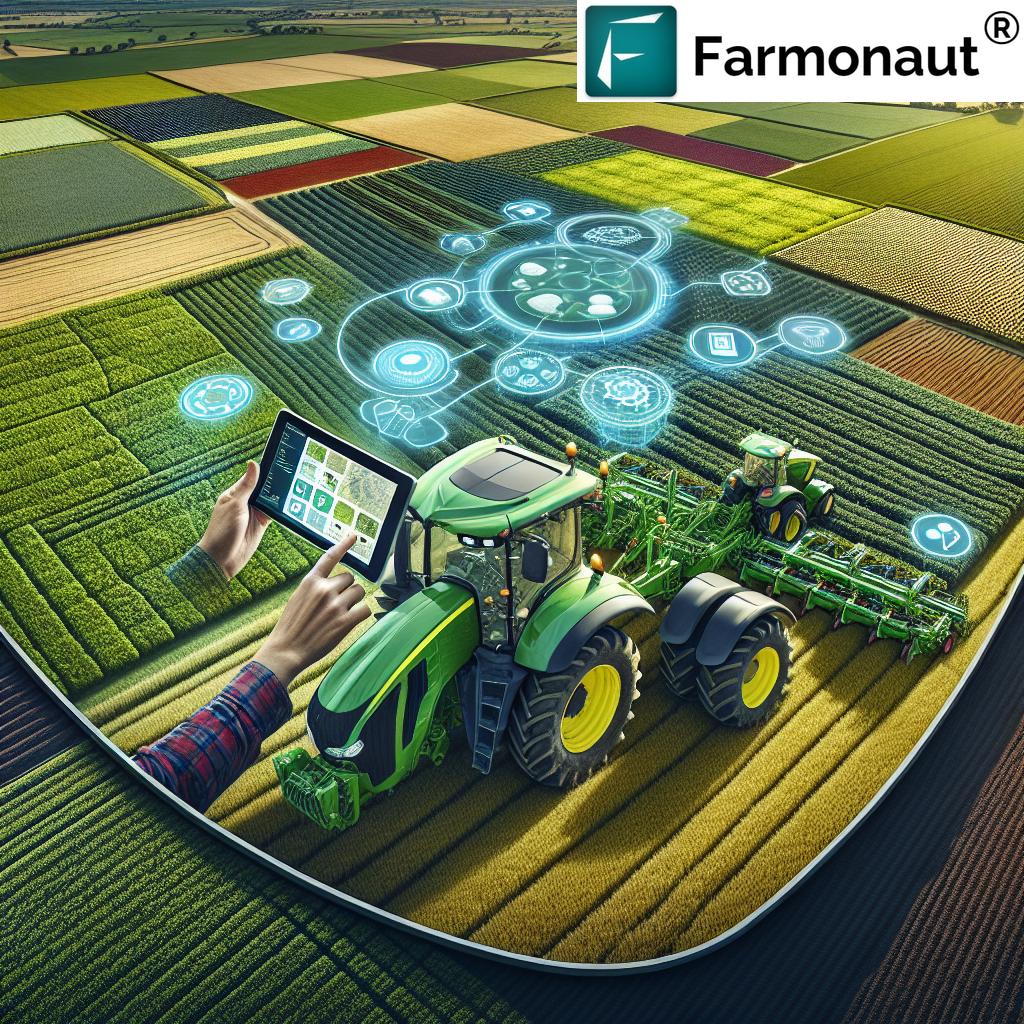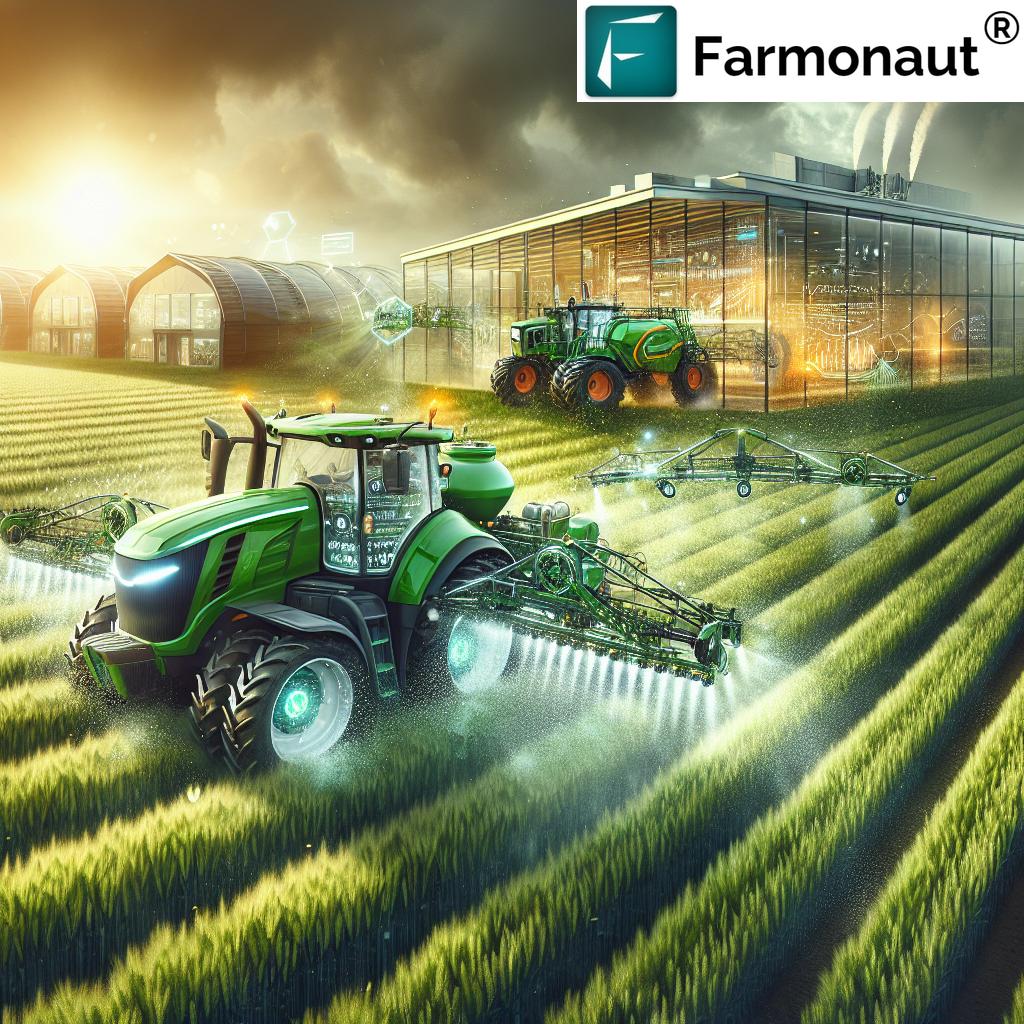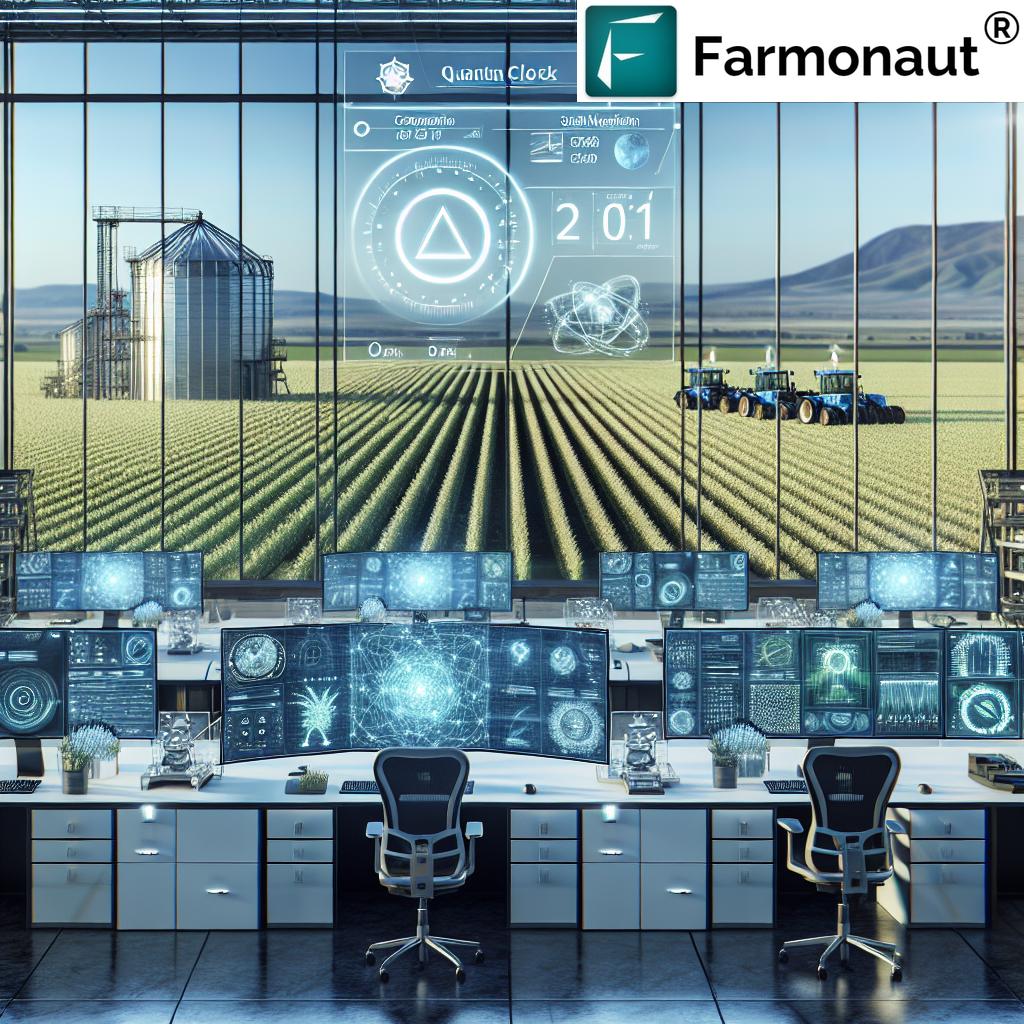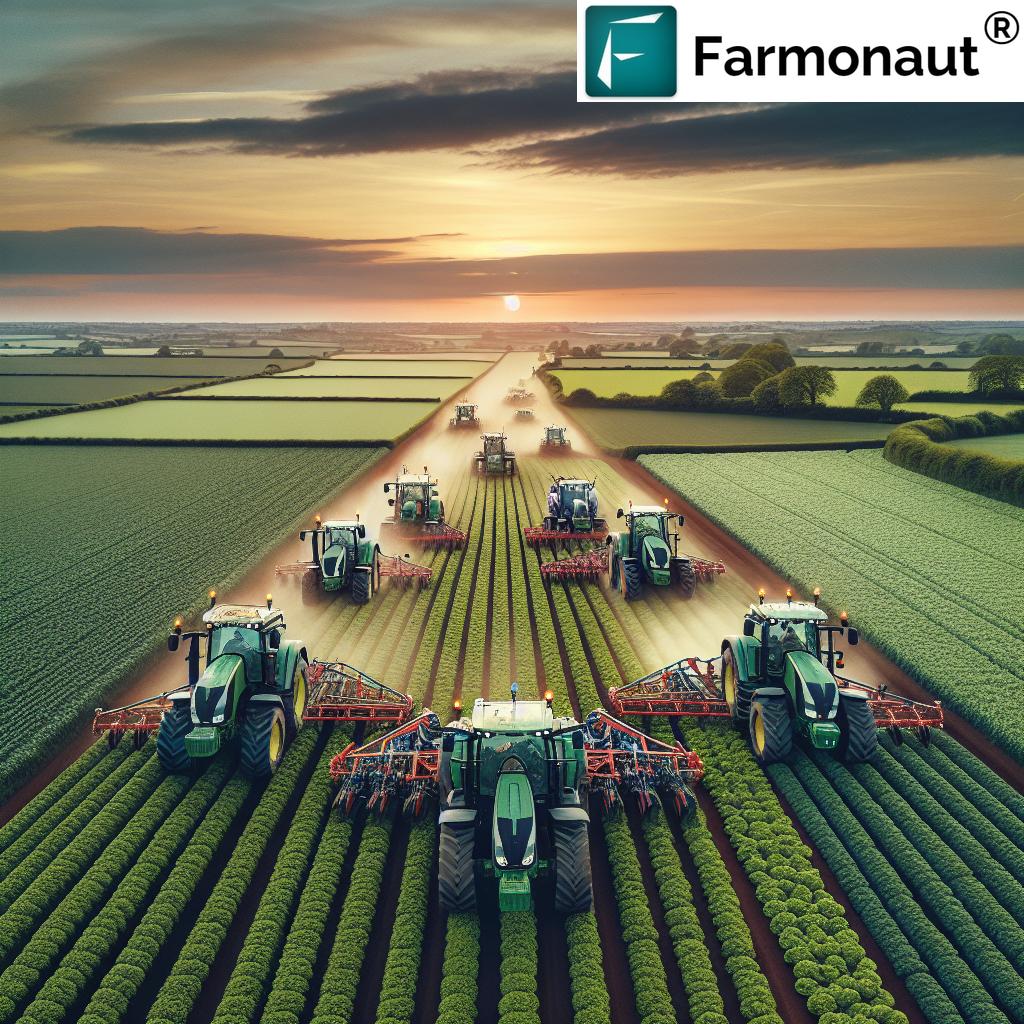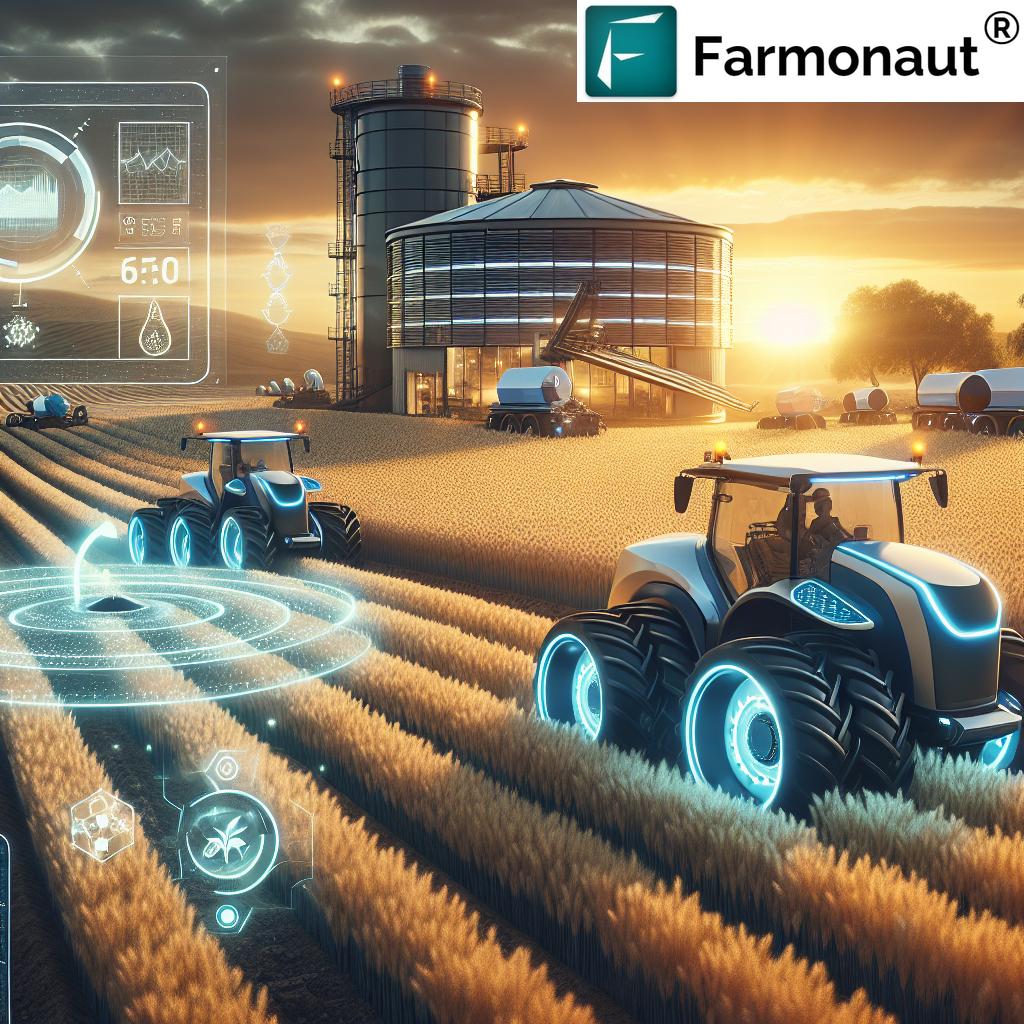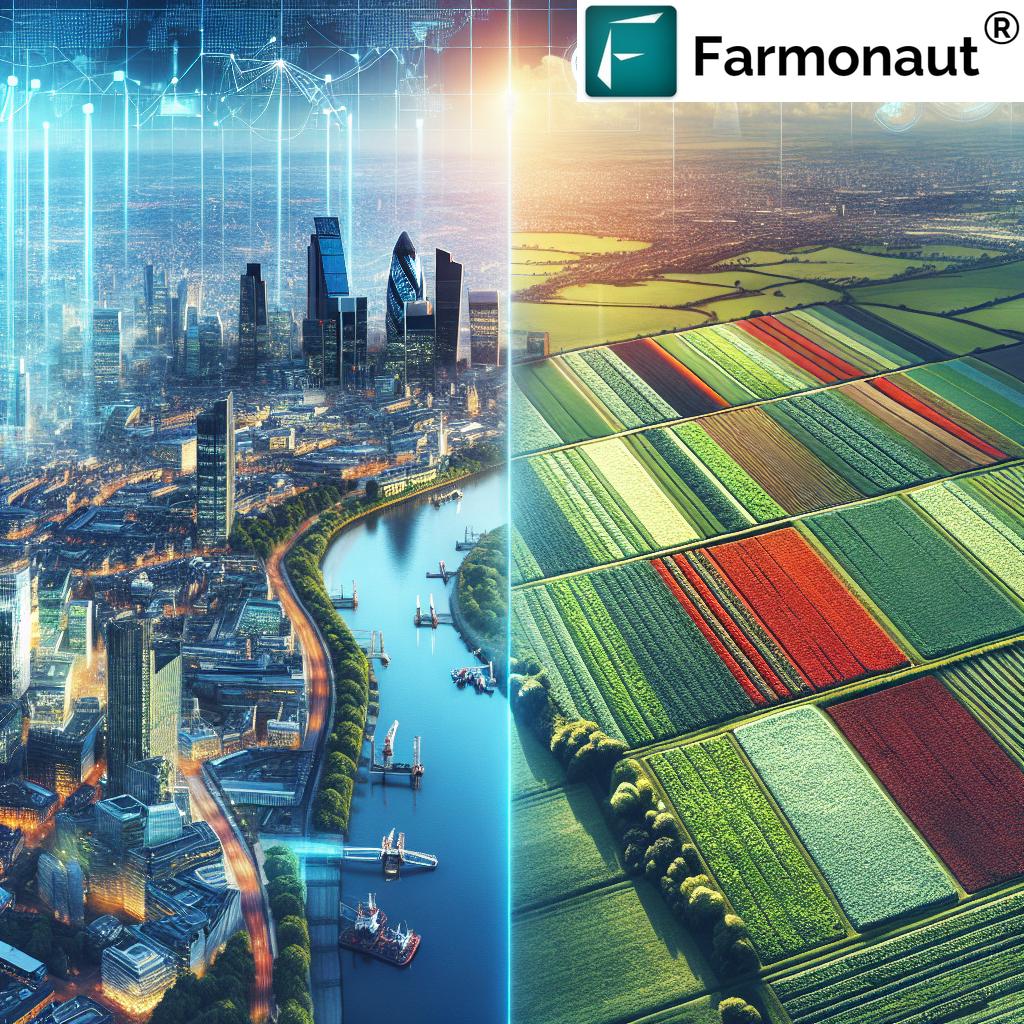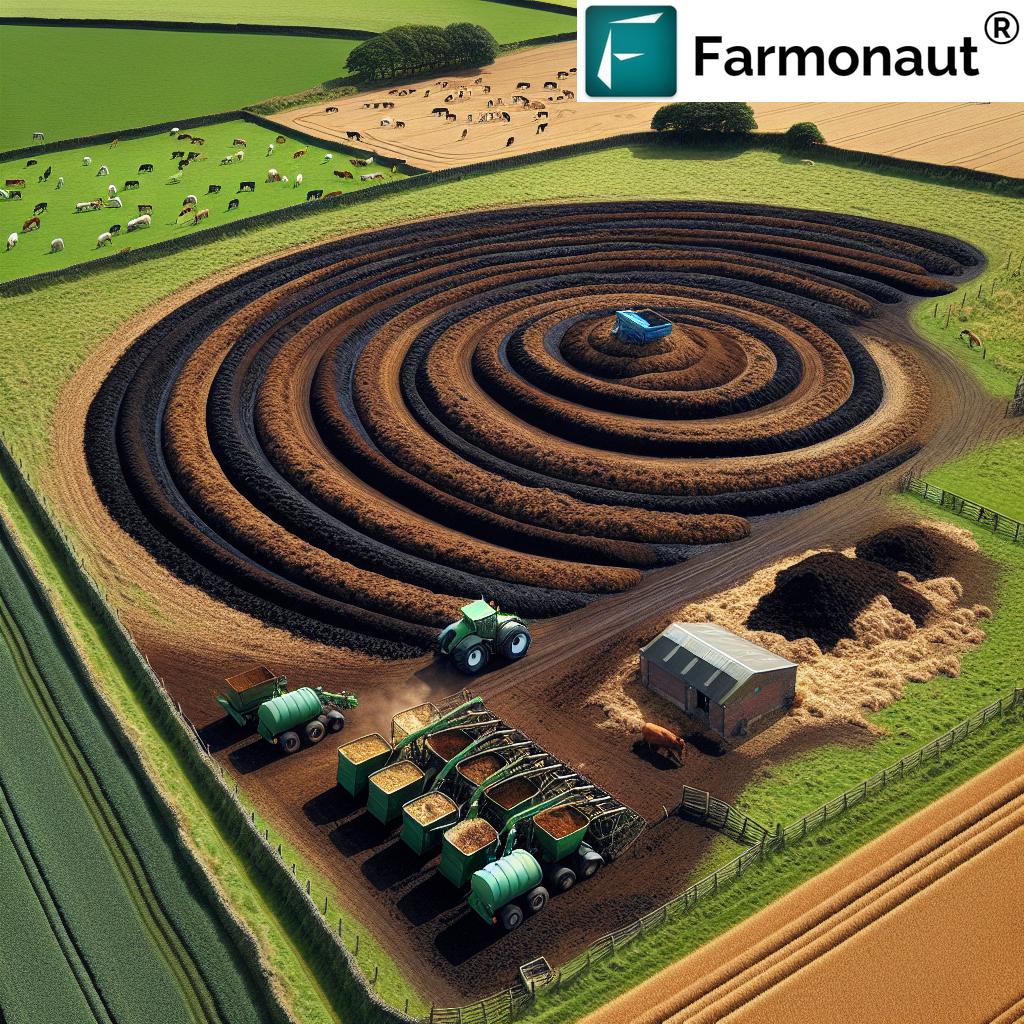Revolutionizing UK Agriculture: Precision Farming Technology for Enhanced Crop Quality and Yield
“Precision farming technology can increase crop yields by up to 30% while reducing water usage by 20-50%, revolutionizing UK agriculture.”
In the heart of the United Kingdom’s agricultural landscape, a revolution is underway. From the rolling hills of Powys to the fertile plains of East Anglia, farmers are embracing cutting-edge precision farming technologies that are reshaping the way we grow crops, manage livestock, and steward our land. As we delve into this transformative journey, we’ll explore how these innovations are not just enhancing crop quality and yield but also paving the way for a more sustainable and efficient future in UK agriculture.
The Dawn of Precision Agriculture in the UK
Precision agriculture, also known as precision farming, is an approach that leverages technology to optimize crop yields and reduce waste. In the UK, this approach has gained significant traction, particularly in regions like New Radnor and Presteigne, where farmers are keen to maximize their land’s potential while minimizing environmental impact.
- Satellite-guided tractors for precise field operations
- Drone technology for crop monitoring and spraying
- IoT sensors for real-time soil and crop data collection
- AI and machine learning for predictive analytics in farming
These technologies are not just futuristic concepts; they’re being implemented across UK farms today, revolutionizing traditional practices and boosting productivity.
GIS and Remote Sensing: The Eyes in the Sky
“GIS and remote sensing applications in agriculture can improve resource efficiency by 15-25%, optimizing farm operations across the UK.”
Geographic Information Systems (GIS) and remote sensing have become indispensable tools in modern agriculture. These technologies provide farmers with a bird’s-eye view of their land, offering insights that were previously impossible to obtain.
- Crop health monitoring through multispectral imaging
- Precise mapping of soil properties and topography
- Early detection of pest infestations and diseases
- Optimization of irrigation and fertilizer application
By leveraging these technologies, UK farmers can make data-driven decisions that lead to more efficient use of resources and improved crop yields.
Advanced Irrigation Systems: Precision Water Management
Water is a precious resource, and in agriculture, its efficient use is paramount. Advanced irrigation systems are at the forefront of water conservation efforts in UK farming.
- Drip irrigation for targeted water delivery
- Soil moisture sensors for optimal watering schedules
- Weather-based irrigation controllers
- Precision sprinklers with variable rate technology
These systems not only conserve water but also contribute to better crop health by ensuring plants receive the right amount of water at the right time.
Innovative Solutions for Pest Control, Disease Management, and Weed Suppression
One of the most significant challenges in agriculture is managing pests, diseases, and weeds. Precision farming technologies are offering new, more targeted approaches to these age-old problems.
- AI-powered image recognition for early pest detection
- Precision spraying systems for reduced chemical use
- Biological pest control methods integrated with technology
- Robotic weeders for mechanical weed suppression
These innovations not only improve crop health but also contribute to more sustainable farming practices by reducing the reliance on chemical interventions.
Tractor Parts and Accessories: The Backbone of Precision Farming
While we focus on high-tech solutions, it’s important to remember that traditional farm equipment, particularly tractors, remain the workhorses of agriculture. However, these machines are evolving to meet the demands of precision farming.
- GPS-guided auto-steering systems for precise field navigation
- Variable-rate controllers for precise input application
- Telematics systems for real-time equipment monitoring
- Precision planting attachments for optimal seed placement
These advancements in tractor parts and accessories are essential for implementing precision farming techniques effectively.
Electric Fencing for Livestock: Precision Grazing Management
Precision agriculture isn’t limited to crop production. Livestock farmers are also benefiting from technological advancements, particularly in the realm of grazing management.
- Solar-powered electric fencing systems for flexible pasture management
- GPS-enabled virtual fencing for precise animal control
- Remote monitoring systems for herd health and location tracking
- Automated gates and feeders for efficient livestock handling
These innovations allow for more efficient use of pastureland, improved animal welfare, and reduced labor costs for livestock farmers.
Agricultural Lighting Solutions: Enhancing Crop Growth and Animal Welfare
Lighting plays a crucial role in both plant growth and animal husbandry. Advanced agricultural lighting solutions are helping UK farmers optimize their production environments.
- LED grow lights for indoor and greenhouse cultivation
- Photoperiod manipulation systems for livestock productivity
- Smart lighting controls for energy efficiency
- UV sterilization lights for disease control in animal housing
These lighting technologies not only improve crop yields and animal welfare but also contribute to energy savings on the farm.
The Role of Farm Supply Stores in the Precision Farming Revolution
As precision farming technologies become more prevalent, farm supply stores play a crucial role in providing farmers with the tools and knowledge they need to implement these innovations.
- Stocking precision farming equipment and accessories
- Offering technical support and training for new technologies
- Providing soil testing services for precision nutrient management
- Supplying precision-formulated fertilizers and crop protection products
Farm supply stores in regions like Maesmelan are evolving to meet the changing needs of farmers in the precision agriculture era.
Agricultural Product Quality Testing: Ensuring Premium Outputs
With the increased focus on product quality in agriculture, testing has become an integral part of the farming process. Precision farming technologies are enhancing our ability to monitor and ensure product quality.
- Portable NIR spectrometers for on-field crop quality assessment
- Automated milk testing systems for dairy farms
- Grain quality sensors for combine harvesters
- AI-powered visual inspection systems for fruit and vegetable grading
These testing technologies help farmers ensure their products meet the highest standards, potentially commanding premium prices in the market.
The Farmonaut App: Bringing Precision Agriculture to Your Fingertips
In the realm of precision agriculture technology, the Farmonaut app stands out as a comprehensive solution for farmers looking to embrace data-driven farming practices. This innovative platform integrates satellite imagery, AI, and machine learning to provide farmers with actionable insights.
- Real-time crop health monitoring using satellite data
- AI-powered advisory system for personalized farming recommendations
- Weather forecasting and alerts for informed decision-making
- Resource management tools for optimizing inputs
The Farmonaut app is designed to make precision agriculture accessible to farmers of all scales, from small holdings to large commercial operations.
Experience the future of farming with Farmonaut:
The Impact of Precision Farming on UK Agriculture
The adoption of precision farming technologies is having a profound impact on UK agriculture. Let’s explore some of the key benefits:
- Increased crop yields and quality
- Reduced input costs (fertilizers, pesticides, water)
- Improved environmental sustainability
- Enhanced farm profitability
- Better traceability and food safety
These benefits are not just theoretical; they’re being realized on farms across the UK, from small family operations to large commercial enterprises.
Overcoming Challenges in Precision Agriculture Adoption
While the benefits of precision agriculture are clear, there are challenges that UK farmers face in adopting these technologies:
- Initial investment costs
- Technical skill requirements
- Data management and privacy concerns
- Integration with existing farm equipment
Addressing these challenges is crucial for the widespread adoption of precision farming technologies in the UK.
The Future of UK Agriculture: Trends and Predictions
As we look to the future, several trends are shaping the landscape of UK agriculture:
- Increased automation and robotics in farming operations
- Greater integration of AI and machine learning in decision-making
- Expansion of vertical farming and controlled environment agriculture
- Growing emphasis on regenerative and carbon-neutral farming practices
These trends suggest an exciting future for UK agriculture, one that combines technological innovation with sustainable practices.
Precision Agriculture and Policy: Shaping the Future of UK Farming
The adoption of precision agriculture technologies is not just a matter for individual farmers; it’s also influencing agricultural policy in the UK. Policymakers are increasingly recognizing the potential of these technologies to address key challenges in the sector.
- Incentives for adoption of precision farming technologies
- Research funding for agricultural innovation
- Regulatory frameworks for data privacy and security in agriculture
- Integration of precision farming in environmental stewardship schemes
These policy initiatives are crucial for creating an environment that supports the continued growth and adoption of precision agriculture in the UK.
Educational Initiatives: Preparing the Next Generation of Farmers
As precision agriculture becomes more prevalent, there’s a growing need for education and training in these new technologies. Universities and agricultural colleges across the UK are responding to this need.
- Specialized courses in precision agriculture and agri-tech
- Partnerships between educational institutions and technology providers
- On-farm training programs for existing farmers
- Integration of digital skills in traditional agricultural curricula
These educational initiatives are essential for ensuring that the UK has a skilled workforce ready to leverage precision farming technologies.
Case Study: Precision Agriculture in Action
To illustrate the real-world impact of precision agriculture, let’s look at a hypothetical case study of a farm in Powys, Wales:
Bryn Mawr Farm, a 500-hectare mixed farming operation, implemented a suite of precision agriculture technologies over the past five years. The results have been transformative:
- 20% increase in wheat yields through variable rate seeding and fertilization
- 30% reduction in pesticide use through targeted application
- 15% improvement in water use efficiency with precision irrigation
- 25% increase in pasture productivity through rotational grazing aided by electric fencing
This case study demonstrates the tangible benefits that precision agriculture can bring to UK farms.
The Role of Data in Precision Agriculture
At the heart of precision agriculture is data. The ability to collect, analyze, and act on data is what makes these technologies so powerful. Here’s how data is transforming UK agriculture:
- Real-time decision making based on current field conditions
- Historical data analysis for long-term farm planning
- Predictive analytics for crop yield forecasting
- Benchmarking farm performance against industry standards
The effective use of data is key to unlocking the full potential of precision agriculture.
Precision Agriculture and Sustainability
One of the most significant benefits of precision agriculture is its potential to enhance the sustainability of farming practices. Here’s how these technologies are contributing to more sustainable agriculture in the UK:
- Reduced use of chemical inputs through targeted application
- Improved soil health through precision tillage and cover cropping
- Enhanced biodiversity through precision habitat management
- Reduced greenhouse gas emissions through efficient resource use
By enabling more efficient and targeted use of resources, precision agriculture is helping UK farmers reduce their environmental footprint while maintaining or improving productivity.
The Economic Impact of Precision Agriculture
The adoption of precision agriculture technologies is not just changing farming practices; it’s also having a significant economic impact on the UK agricultural sector:
- Increased farm profitability through improved yields and reduced input costs
- New job creation in agri-tech and related fields
- Improved competitiveness of UK agriculture in global markets
- Development of new export opportunities for UK agri-tech innovations
These economic benefits are helping to secure the future of UK agriculture in an increasingly competitive global marketplace.
Precision Agriculture and Food Security
As the global population continues to grow, ensuring food security is becoming increasingly important. Precision agriculture has a crucial role to play in this:
- Increasing crop yields to meet growing food demand
- Improving resilience to climate change through data-driven decision making
- Reducing food waste through precise harvesting and storage techniques
- Enhancing traceability to ensure food safety
By enabling more efficient and productive farming practices, precision agriculture is helping to ensure that the UK can continue to produce high-quality food for its population and for export.
The Role of Artificial Intelligence in Precision Agriculture
Artificial Intelligence (AI) is playing an increasingly important role in precision agriculture. Here’s how AI is being used in UK farming:
- Crop disease detection through image analysis
- Predictive maintenance for farm machinery
- Automated crop yield prediction
- Personalized crop management recommendations
AI technologies are helping to make precision agriculture even more precise, enabling farmers to make highly informed decisions based on complex data analysis.
Precision Agriculture and the Consumer
The impact of precision agriculture extends beyond the farm gate to the consumer. Here’s how these technologies are influencing the food we eat:
- Improved food quality through optimized growing conditions
- Enhanced traceability for food safety and consumer confidence
- Potential for more personalized nutrition through precision growing techniques
- Reduced environmental impact of food production
As consumers become more aware of how their food is produced, the adoption of precision agriculture technologies can help meet growing demands for sustainable, high-quality food products.
Precision Agriculture Technology Comparison
| Technology Type | Key Features | Benefits to Crop Quality | Estimated Yield Increase |
|---|---|---|---|
| GIS/Remote Sensing | Satellite imagery, multispectral analysis | Early stress detection, precise nutrient management | 10-15% |
| Advanced Irrigation Systems | Soil moisture sensors, variable rate application | Optimal water usage, reduced plant stress | 15-20% |
| Pest Control Solutions | AI-powered detection, targeted application | Reduced pest damage, lower chemical residues | 5-10% |
| Farmonaut’s App | Satellite-based monitoring, AI advisory | Comprehensive crop management, data-driven decisions | 20-30% |
Frequently Asked Questions
Q: What is precision agriculture?
A: Precision agriculture is a farming management concept that uses technology to observe, measure, and respond to variability in crops. It involves using GPS, sensors, and data analytics to optimize farming practices.
Q: How does precision agriculture benefit UK farmers?
A: Precision agriculture can increase crop yields, reduce input costs, improve environmental sustainability, and enhance overall farm profitability.
Q: What are some common precision agriculture technologies used in the UK?
A: Common technologies include GPS-guided tractors, drone-based crop monitoring, IoT sensors for soil and crop data collection, and apps like Farmonaut for comprehensive farm management.
Q: How does the Farmonaut app contribute to precision agriculture?
A: The Farmonaut app provides real-time crop health monitoring using satellite data, AI-powered advisory systems, weather forecasting, and resource management tools to help farmers make data-driven decisions.
Q: Is precision agriculture only for large farms?
A: No, precision agriculture technologies can be scaled to suit farms of all sizes. Many solutions, like the Farmonaut app, are designed to be accessible and beneficial for small to medium-sized farms as well.
Q: How does precision agriculture contribute to sustainability?
A: Precision agriculture enhances sustainability by reducing the use of water, fertilizers, and pesticides through targeted application, minimizing environmental impact while maintaining or improving crop yields.
Conclusion: The Future is Precision
As we’ve explored throughout this blog, precision agriculture is revolutionizing UK farming. From the fields of Powys to the tech hubs developing cutting-edge agricultural solutions, the UK is at the forefront of this agricultural revolution. The integration of technologies like GIS, remote sensing, advanced irrigation systems, and innovative apps like Farmonaut is not just enhancing crop quality and yield; it’s reshaping the very nature of farming.
The future of UK agriculture is one of data-driven decision making, sustainable practices, and increased productivity. As these technologies continue to evolve and become more accessible, we can expect to see even greater transformations in how we grow our food and manage our land.
For farmers looking to stay ahead of the curve, embracing precision agriculture is no longer optional—it’s essential. And with solutions like the Farmonaut app making these technologies more accessible than ever, there’s never been a better time to take the leap into the future of farming.
As we look to the future, one thing is clear: precision agriculture will play a crucial role in ensuring that UK farming remains competitive, sustainable, and capable of meeting the challenges of feeding a growing population in a changing climate. The revolution is here, and it’s precision-guided.
